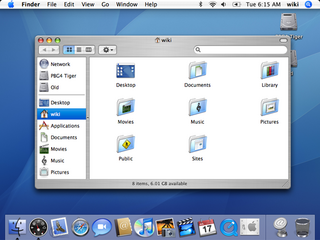
macOS, originally Mac OS X, previously shortened as OS X, is an operating system developed and marketed by Apple since 2001. It is the primary operating system for Apple's Mac computers. Within the market of desktop and laptop computers, it is the second most widely used desktop OS, after Microsoft Windows and ahead of all Linux distributions, including ChromeOS.

Mac OS X Server is a series of discontinued Unix-like server operating systems developed by Apple Inc. based on macOS. It provided server functionality and system administration tools, and tools to manage both macOS-based computers and iOS-based devices, network services such as a mail transfer agent, AFP and SMB servers, an LDAP server, and a domain name server, as well as server applications including a Web server, database, and calendar server.

Cyberdog was an OpenDoc-based Internet suite of applications, developed by Apple Computer for the Mac OS line of operating systems. It was introduced as a beta in February 1996 and abandoned in March 1997. The last version, Cyberdog 2.0, was released on April 28, 1997. It worked with later versions of System 7 as well as the Mac OS 8 and Mac OS 9 operating systems.
MorphOS is an AmigaOS-like computer operating system (OS). It is a mixed proprietary and open source OS produced for the Pegasos PowerPC (PPC) processor based computer, PowerUP accelerator equipped Amiga computers, and a series of Freescale development boards that use the Genesi firmware, including the Efika and mobileGT. Since MorphOS 2.4, Apple's Mac mini G4 is supported as well, and with the release of MorphOS 2.5 and MorphOS 2.6 the eMac and Power Mac G4 models are respectively supported. The release of MorphOS 3.2 added limited support for Power Mac G5. The core, based on the Quark microkernel, is proprietary, although several libraries and other parts are open source, such as the Ambient desktop.

AppleWorks was an integrated office suite containing a word processor, database, and spreadsheet. It was developed by Rupert Lissner for Apple Computer, originally for the Apple II and launched in 1984. Many enhancements for AppleWorks were created, the most popular being the TimeOut series from Beagle Bros which extended the life of the Apple II version of AppleWorks. Appleworks was later reworked for the Macintosh platform.

System 7 is the seventh major release of the classic Mac OS operating system for Macintosh computers, made by Apple Computer. It was launched on May 13, 1991, to succeed System 6 with virtual memory, personal file sharing, QuickTime, TrueType fonts, the Force Quit dialog, and an improved user interface.

Mac OS 8 is the eighth major release of the classic Mac OS operating system for Macintosh computers, released by Apple Computer on July 26, 1997. It includes the largest overhaul of the classic Mac OS experience since the release of System 7, approximately six years before. It places a greater emphasis on color than prior versions. Released over a series of updates, Mac OS 8 represents an incremental integration of many of the technologies which had been developed from 1988 to 1996 for Apple's overly ambitious OS named Copland. Mac OS 8 helped modernize the Mac OS while Apple developed its next-generation operating system, Mac OS X.
CodeWarrior is an integrated development environment (IDE) published by NXP Semiconductors for editing, compiling, and debugging software for several microcontrollers and microprocessors and digital signal controllers used in embedded systems.

Mac OS X Tiger is the 5th major release of macOS, Apple's desktop and server operating system for Mac computers. Tiger was released to the public on April 29, 2005 for US$129.95 as the successor to Mac OS X 10.3 Panther. Included features were a fast searching system called Spotlight, a new version of the Safari web browser, Dashboard, a new 'Unified' theme, and improved support for 64-bit addressing on Power Mac G5s. Mac OS X 10.4 Tiger also had a number of additional features that Microsoft had spent several years struggling to add to Windows with acceptable performance, such as fast file search and improved graphics processing.

Internet Explorer for Mac was a proprietary web browser developed by Microsoft for the Macintosh platform to browse web pages. Initial versions were developed from the same code base as Internet Explorer for Windows. Later versions diverged, particularly with the release of version 5, which included the cutting-edge, fault-tolerant and highly standards-compliant Tasman layout engine.

Microsoft Internet Explorer 4 (IE4) is the fourth, and by now, discontinued, version of the Internet Explorer graphical web browser that Microsoft unveiled in Spring of 1997, and released on September 22, 1997, primarily for Microsoft Windows, but also with versions available for the classic Mac OS, Solaris, and HP-UX and marketed as "The Web the Way You Want It".

Rosetta is a dynamic binary translator developed by Apple Inc. for macOS, an application compatibility layer between different instruction set architectures. It enables a transition to newer hardware, by automatically translating software. The name is a reference to the Rosetta Stone, the artifact which enabled translation of Egyptian hieroglyphs.

Dovecot is an open-source IMAP and POP3 server for Unix-like operating systems, written primarily with security in mind. Timo Sirainen originated Dovecot and first released it in July 2002. Dovecot developers primarily aim to produce a lightweight, fast and easy-to-set-up open-source email server.

A Hackintosh is a computer that runs Apple's Macintosh operating system macOS on computer hardware that is not authorized for the purpose by Apple. This can also include running Macintosh software on hardware it is not originally authorized for. Benefits of "Hackintoshing" can include cost, ease of repair and piecemeal upgrade, and freedom to use customized choices of components that are not available in the branded Apple products. macOS can also be run on several non-Apple virtualization platforms, although such systems are not usually described as Hackintoshes. Hackintosh laptops are sometimes referred to as "Hackbooks".

Claris Home Page was one of the earliest true WYSIWYG HTML editors, developed from 1994 on. The project was code-named Loma Prieta. Claris purchased it from San Andreas Systems, reworked it to use the user interface common to all their products, and released it in 1996.
The Mac OS nanokernel is an operating system kernel that serves as the basis of most PowerPC based system software versions 7 through 9 of the classic Mac OS, predating Mac OS X.
WarpOS is a multitasking kernel for the PowerPC (PPC) architecture central processing unit (CPU) developed by Haage & Partner for the Amiga computer platform in the late 1990s and early 2000s. It runs on PowerUP accelerator boards developed by phase5 which contains both a Motorola 68000 series CPU and a PowerPC CPU with shared address space. WarpOS runs alongside the 68k-based AmigaOS, which can use the PowerPC as a coprocessor. Despite its name, it is not an operating system (OS), but a kernel; it supplies a limited set of functions similar to those in AmigaOS for using the PowerPC. When released, its original name was WarpUP, but was changed to reflect its greater feature set, and possibly to avoid comparison with its competitor, PowerUP.
MobileMe is a discontinued subscription-based collection of online services and software offered by Apple Inc. All services were gradually transitioned to and eventually replaced by the free iCloud, and MobileMe ceased on June 30, 2012, with transfers to iCloud being available until July 31, 2012, or data being available for download until that date, when the site finally closed completely. On that date all data was deleted, and email addresses of accounts not transferred to iCloud were marked as unused.

Mac OS is the series of operating systems developed for the Macintosh family of personal computers by Apple Computer, Inc. from 1984 to 2001, starting with System 1 and ending with Mac OS 9. The Macintosh operating system is credited with having popularized the graphical user interface concept. It was included with every Macintosh that was sold during the era in which it was developed, and many updates to the system software were done in conjunction with the introduction of new Macintosh systems.












